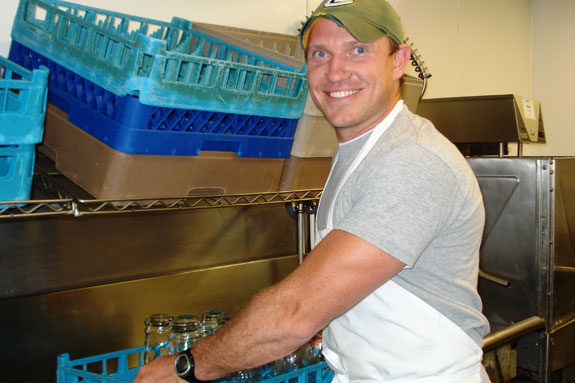Throughout high school and college it seemed like everyone I knew had a seasonal or part-time job working at a restaurant. I remember one really fun summer as a cook at my uncle’s restaurant. His managers typically only hired cute girls to work the “front of the house,” so I never made my way up near the customers. However, I learned a lot of interesting things working in the bar and restaurant industry that summer. In fact, one of the lessons I learned was that it’s not politically correct to call waiters and waitresses by those titles. For those of you who haven’t already heard, the proper term these days is server.
What a fitting description! People who work to make your dining experience enjoyable, in exchange for performance-based compensation, are called servers. Their main focus is to serve the people who help them make their living. And, as a huge believer in servant leadership, I tend to think this job description applies to all of us in many ways.
Whenever I’m at a restaurant and receive particularly good, or alternately really bad service, I can’t help but compare the role of dairy managers with that of servers.
Good servers are able to keep a lot of people eating and drinking without any guests missing a beat. They run from table to table, to the kitchen and the bar, and back to the tables, always remembering and taking care of the needs of the people in the dining room. The servers count on the cooks and bartenders to make sure everything is prepared properly so the basic needs of the customers are met, sort of like the role of a dairy’s feeder and herdsmen. And as long as their meals and drinks (feed and herd health) are “made to order” correctly, the servers can concentrate on making sure the guests do what they’re supposed to do.
You see, good servers don’t have time to actually do the work in the kitchen or behind the bar. They’re too busy checking up on everyone they’re responsible for, making sure their guests have everything they need. And your role as a manager isn’t that much different. You’re too busy keeping everyone else on task to have time to stay in one spot for very long, doing the actual work yourself. Just as a server goes from table to table to check on how each customer is doing, your role is to go from one area to another, making sure each worker is doing his job according to your company’s protocols.
Once your team realizes that you’re good on your feet and you don’t miss any details, you’ll see how well everyone responds. Just as servers do, you’re also working for tips every day. No, your employees don’t pay you with money. They reward your performance with their own. And in your world, you need them to give you a lot more than 15 percent. PD

-
Tom Wall
- Language Links, LLC
- Email Tom Wall





